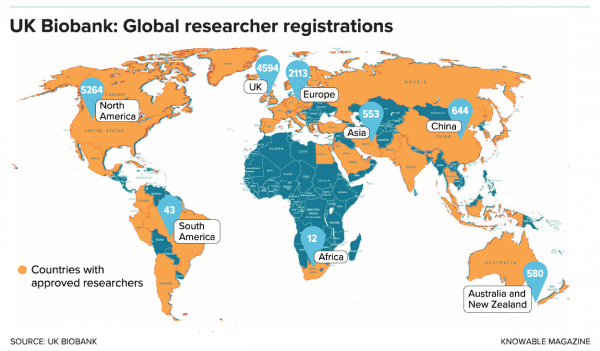How big data can answer fundamental questions about human health
- by 7wData

Fly into Britain's Manchester Airport these days and you might spot a new landmark amid the urban sprawl on the ground below. Two huge white cylinders stand sentinel: the only outward sign of a massive biomedical project that promises a revolution in science and health care. And like all revolutions, this one is born in blood.
The cylinders pump liquid nitrogen into a facility called the U.K. Biobank. Inside the walls of this anonymous-looking industrial unit, scientists hold the bodily fluids of half a million Britons in state-of-the-art, robot-managed freezers. Research does not come more open-access than this. Blood biochemistry, genetic analysis, images of brains, hearts, and other organs — all the internal secrets of volunteers — are combined with intimate personal confessions about lifestyle, such as how many sexual partners someone's had, how much alcohol they drink, and if they routinely drive faster than the motorway speed limit.
The results of that largesse are flowing. In a given month, dozens of scientific studies can appear based on U.K. Biobank data. They range from the curious — how many cups of coffee can safely be consumed in a single day — to the fundamental, such as the discovery that specific gene variants are associated with disease or healthy life expectancy. And in an area of research where size is crucial, such studies count their volunteers not by the hundred or the thousand, but by the hundred thousand. More than a century after Ernest Rutherford's Manchester lab showed the world how to unlock the secrets inside the atom, the city is showcasing how Big Data can answer fundamental questions about human health.
"The U.K. Biobank is the gold standard right now," says Josh Denny, a researcher in biomedical informatics at Vanderbilt University Medical Center in Nashville, Tennessee. "Worldwide it's the benchmark of an open-access large database with rich information and genetics." Denny published an article on this subject — using clinical data to get the most out of genomic research — for the Annual Review of Biomedical Data Science in 2018. "What we do when we bring health care and genetics data together is to get at the outcomes that are important to us," he says.
Even as results emerge touching on everything from aging to susceptibility to asthma, the biobank effort isn't without its detractors or bumps in the road. Some worry that the broad nature of the research done with the samples makes it impossible for volunteers to give proper consent. And in October, a high-profile paper was withdrawn because of technical problems in the way biobank data were analyzed.
But to scientists like Denny, the promise is clear. "This is a resource for the world," he says.
The principle behind the U.K. Biobank is ambitious: to link health outcomes to the genetic data that pour from DNA sequencing machines across the world. Medicine traditionally is guided by a patient's physical symptoms and measurable changes to physiology — what biologists call the phenotype. Integrating genetic data — a patient's genotype — into these deliberations could help tailor treatments to boost their effectiveness, or even identify people at higher risk of developing a given disease, who could be offered help earlier. But to make that work, scientists need to connect the dots: match genotype to phenotype, find patterns and connections in the way people's DNA varies and the way their health does, too.
Those connections are becoming clearer. In February this year, for example, scientists found genetic markers in the biobank data that linked high cholesterol to the development of motor neuron disease. Cholesterol-lowering drugs like statins, the results suggest, might prevent this deadly and incurable condition.
[Social9_Share class=”s9-widget-wrapper”]
Upcoming Events
From Text to Value: Pairing Text Analytics and Generative AI
21 May 2024
5 PM CET – 6 PM CET
Read More


